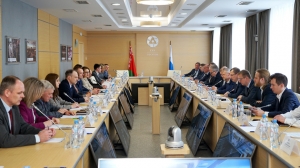Belarusian specialists get familiar with Rosatom's radioactive waste management technologies

MINSK, 18 April (BelTA) – Belarusian specialists have been made familiar with Rosatom's cutting-edge technologies for closing the nuclear fuel cycle and managing waste, BelTA learned from Rosatom's TVEL Fuel Company.
A Belarusian delegation went to Russia's Tomsk Oblast to get familiar with cutting-edge Russian technologies in the area of closing the nuclear fuel cycle, decommissioning of nuclear and radiation-hazardous facilities, and managing radioactive waste. The trip was organized by Rosatom's TVEL Fuel Company, which is the integrator of the Russian nuclear industry and the base organization of the Commonwealth of Independent States in this field.
Employees of the Belarusian Energy Ministry and the Nuclear and Radiation Safety Department of the Belarusian Emergencies Ministry (Gosatomnadzor), power engineers of the Belarusian nuclear power plant and the national energy company Belenergo, scientists of the National Academy of Sciences of Belarus, and representatives of other organizations visited Tomsk Polytechnic University, Siberian Chemical Plant in Seversk (an enterprise of Rosatom's TVEL Fuel Company) and the Seversk branch of the national operator in charge of managing radioactive waste.
While on a tour of Siberian Chemical Plant participants of the trip went to the pilot-demonstration energy complex, which is being built as part of the strategic power engineering project Proryv [breakthrough]. The complex includes a nuclear power plant unit with an innovative reactor based on fast neutrons and named as Brest-OD 300 as well as on-site fuel cycle facilities: a module for fabricating fresh uranium-plutonium fuel and a module for processing irradiated fuel. As part of the technological scheme spent fuel will be processed and will be used for refabricating fresh nuclear fuel. It will make the pilot-demonstration energy complex virtually fully autonomous and independent from external deliveries of energy resources.
For the first time in the history of the world nuclear energy industry the pilot-demonstration energy complex will demonstrate stable operation of closed nuclear fuel cycle installations. Its introduction will allow expanding the raw materials base of the nuclear energy industry thanks to depleted uranium and plutonium. It will significantly reduce the volume of radioactive waste that has to be subjected to final isolation and its activity.
While on a tour of Siberian Chemical Plant, which also serves as the integrator's competence center for decommissioning and management of radioactive waste, the Belarusian specialists examined Russian experience and technologies relating to the final stage of the nuclear fuel cycle. At the radiochemical plant of Siberian Chemical Plant the Belarusian delegation saw an innovative piece of equipment for the vitrification of liquid radioactive waste. The equipment can transform radioactive waste into borosilicate glass for consequent encapsulation, certification, and safe storage.
Apart from that, in Seversk members of the Belarusian delegation visited a facility of the national operator in charge of managing radioactive waste and examined a site under construction where class 3 and class 4 waste will be isolated.
Nikolai Mikhailov, Deputy Director of the Nuclear Energy Department, Head of the Office for Organizing the Operation of Nuclear Power Plants and Management of Radioactive Waste of the Belarusian Energy Ministry, said: “Final isolation of radioactive waste and the construction of a Belarusian facility for waste isolation are priority tasks specified by Belarus' national strategy on managing radioactive waste. This is why getting personally familiar with how it is done at Rosatom enterprises is of strategic importance for the development of our national system for managing radioactive waste.”
One of the most important events of the technical trip was the organization of expert consultations about matters concerning the development of the concept for decommissioning the Belarusian nuclear power plant, matters concerning the organization and management of the process of choosing sites for shallow disposal of radioactive waste, and participation in integration projects of the Union State of Belarus and Russia.
Eduard Nikitin, Director of Nuclear Decommissioning Programs at TVEL Fuel Company, noted: “We are now working out a program of the Union State of Belarus and Russia on ensuring nuclear and radioactive safety with regard to the management of spent nuclear fuel, radioactive waste, and decommissioning. As the base CIS organization TVEL Fuel Company has already received about 30 proposals. The realization of joint projects will contribute to the accomplishment of joint tasks relating to radiation and nuclear safety.”
While at premises of Tomsk Polytechnic University the Belarusian delegation visited the scientific training center Nuclear Research Reactor of the Nuclear Technology Engineering School where scientists and students work with irradiated graphite, barrier clay materials, do work concerning the management of spent nuclear fuel and radioactive waste, radiochemistry. Acting Rector of Tomsk Polytechnic University Leonid Sukhikh underlined that as a backbone higher education institution and a science and technology partner of Rosatom the university is ready to assist Belarusian colleagues in education and in science and technology.
As a result of the visit members of the Belarusian delegation thanked Russian colleagues for the opportunity to visit Rosatom's unique facilities, for the openness and readiness for cooperation. They expressed confidence the experience they had learned would help with safe and effective accomplishment of tasks involving the management of radioactive waste.













